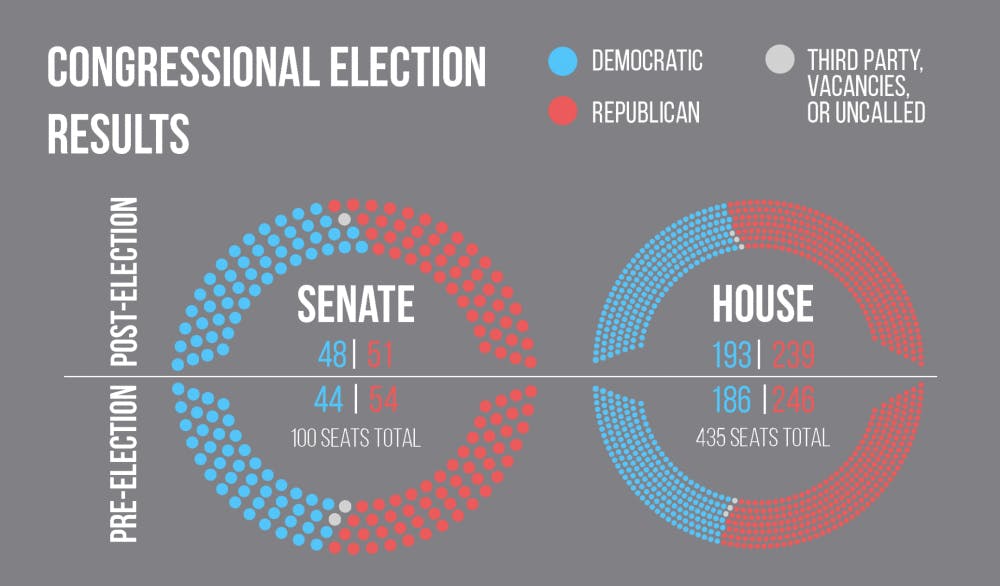The presidency was not the only election of importance this cycle—voters handed Republicans control of Congress for another two years as well.
Unified Republican control of government could mean that several previously-impossible policy initiatives may now find their way into law. Issues such as LGBTQ+ rights, women's health policy and the future of Obamacare could be debated during the coming months. Vice President-elect Mike Pence's record on social issues worries some students, who believe those positions could become reality or at least go unchallenged.
"LGBTQ+ Americans essentially lost a huge advocate in the highest position, and when states pass discriminatory laws, it's likely that the executive branch will just be complacent," said junior Lisa Guraya, president of the Public Policy Studies Major's Union. She noted that President Obama has been an important advocate for LGBTQ+ rights.
Prior to election day, pundits speculated that Democrats could take the majority in the Senate. There were 54 Republican senators and 46 Democratic-affiliated senators in 114th Congress. However, despite gaining two seats, the Democrats were not able to capture the Senate. Democrats were not predicted to regain control of the House, but they did pick up several seats.
Republican policy-proposals may make their way through Congress early next year, but they still may struggle to make it into law. Democrats have some options to slow down legislation, including filibustering in the Senate.
However, Guraya said she did not think the party can afford to become obstructionist.
“When it comes to other issues such as the Affordable Care Act, lots of people are saying the Democrats will have to rely on filibustering, but, personally, I think the Democratic Party needs to be careful of that," Guraya said. "If Democratic leaders stop everything Republicans are trying to do, they’ll become the party of stagnation, and it will affect them in the midterms. At this point, [the midterms] are what Democrats should be focusing on.”
Some policies may be slowed by friction between Trump's White House and the legislative branches. Senior Adam Lemon, former chair of the Duke College Republicans, noted that although President-elect Donald Trump would have an easier time working with a Republican Congress than a Democratic Congress, there could still be "serious tension."
“Many of Trump's policies are simply not conservative, so I would expect the two branches to cooperate on issues like the repeal of Obamacare, deregulation, tax cuts and increased defense spending," Lemon said. "I just can't see issues like paying for an actual wall or protectionist policies actually getting anywhere with Congress."
Trump and the Republican leadership differ ideologically as well, Lemon noted.
“I think Congress will simply budge very little on issues where Trump diverges from the conservative norm," Lemon said. "If Paul Ryan retains the Speaker's chair in the coming session, I would expect his 'A Better Way' policies to clash with Trump's much more populist ones."
In an interview with The Herald Sun, Peter Feaver, professor of political science and a former official in the George W. Bush White House, said Republican governance could have benefits, particularly for the budget.
"Ending the so-called 'sequester' could do away with across-the-board restrictions that don’t allow 'spending to be strategic,'” Feaver said, adding that a stable budget might actually benefit research universities such as Duke.
Although their reelection is still yet to be determined, it is expected that Republican Rep. Paul Ryan will remain Speaker of the House, Democratic Rep. Nancy Pelosi will hold her seat as House Minority Leader and Sen. Mitch McConnell of Kentucky will remain Senate Majority Leader. Sen. Chuck Schumer of New York is likely to replace retiring Senate Minority Leader Harry Reid of Nevada.
The majority of governorships and state legislatures also saw decisive victories for the Republican Party.
Get The Chronicle straight to your inbox
Sign up for our weekly newsletter. Cancel at any time.

